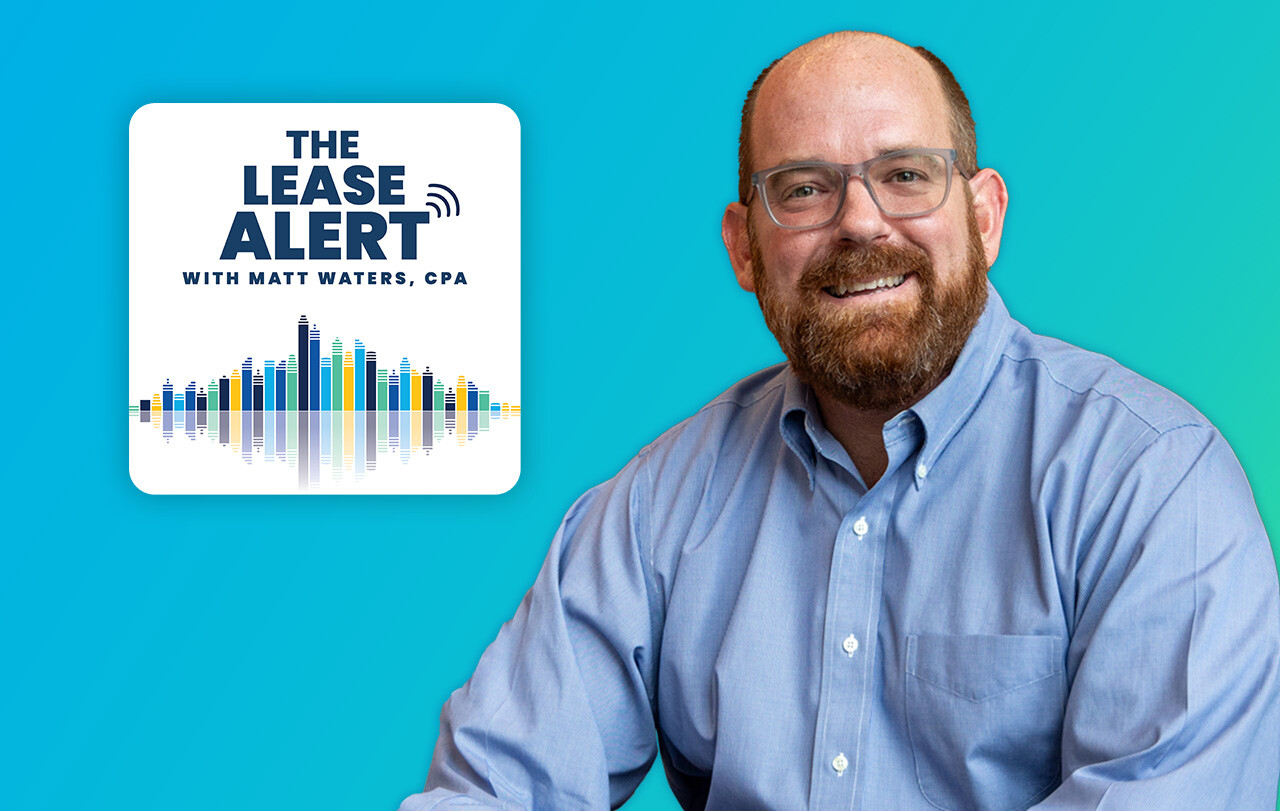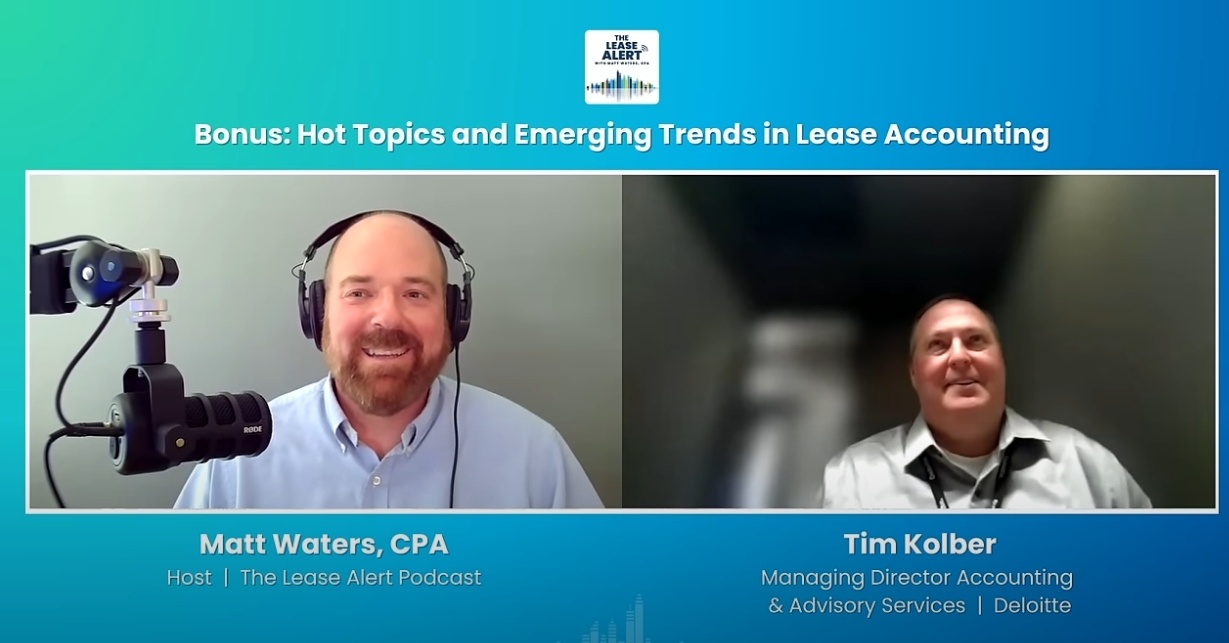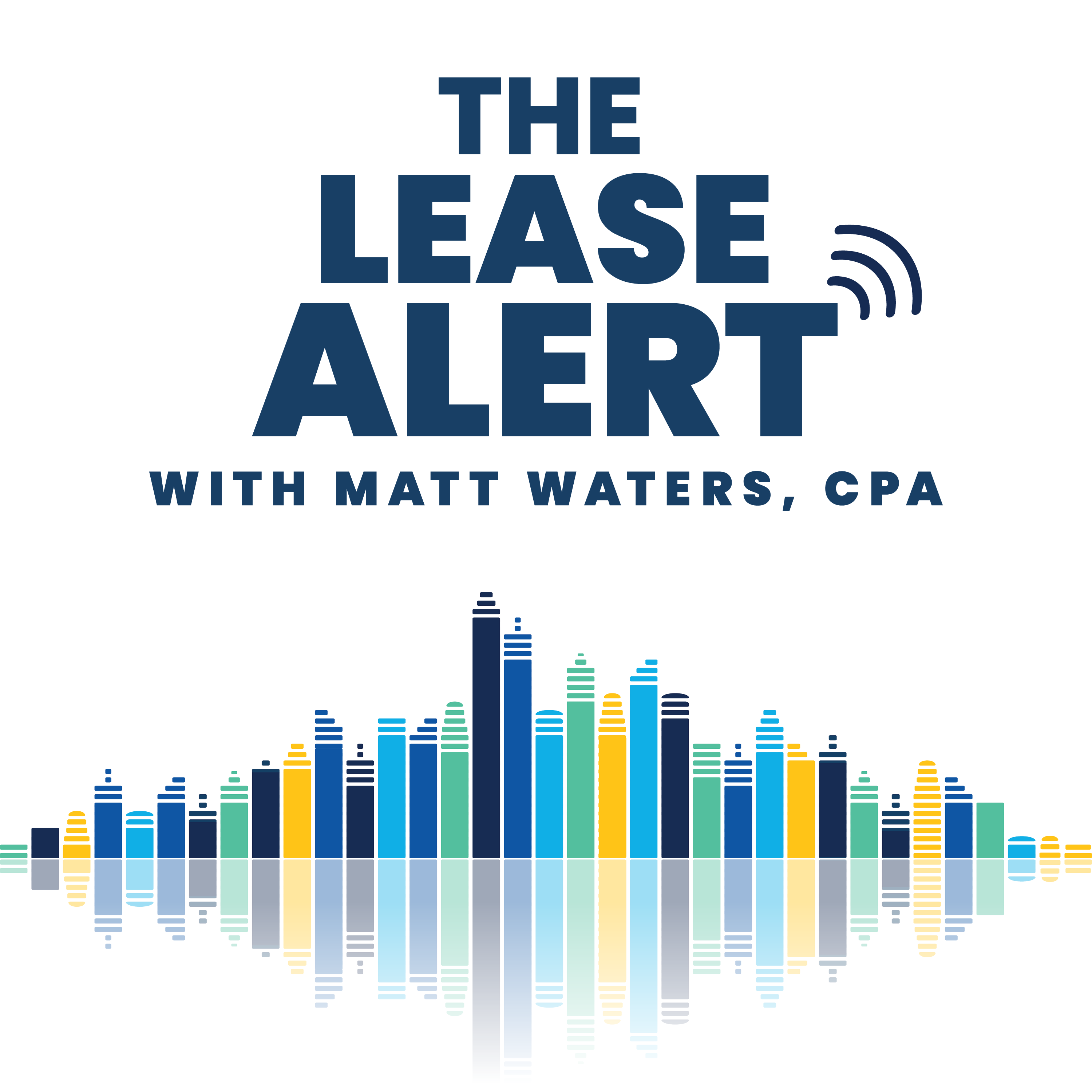Share this
by Matt Waters, CPA on December 26, 2024
The second guest on The Lease Alert podcast wrote the book on lease accounting – literally. But he didn't always want to be an accountant.
Keep reading, watching or listening to learn more about Tim Kolber journey to becoming one of Deloitte's top experts, and why accountants are way more than bean counters.
Watch the episode here or keep reading for all the best tips.
Matt Waters: Tim, can you give us a brief overview of your background and then talk about why you joined the accounting profession?
Tim Kolber: That’s a loaded, loaded question there, Matt. When I was going to college - and just to give you a little background - I went to college at a small university in Philadelphia, LaSalle University. I was actually going to college in the subject area of mathematics. At that point in time, I knew I liked numbers, and I wanted to follow in my sister's footsteps and become an actuary.
Accounting, actuary - not even close when you think about the end professions. As I was going through my college curriculum, I ended up having some challenges in the areas that many people do. When you get to advanced calculus and algebra, that was really tough for me. At that point and juncture in my college career, I had the opportunity to be forced into having to take a three-course regimen, so to speak, in an area outside of my major.
The one I picked was accounting because dealing with numbers from the accounting perspective was probably equally as important as dealing with numbers from the straight mathematics perspective, and I found that I liked accounting. So, I did accounting 101 first and I enjoyed it.
I then went to accounting 102, and then that led into me switching majors from being a math major to being an accounting major. That's ultimately how I ended up in the accounting profession. I really didn't go to school with the goal of becoming an accountant, but ultimately accounting found me, so to speak. And that's how I made my way into the profession.
Matt Waters: Wow. That's really interesting. You know, I had a similar experience. I actually always thought accounting sounded rather dry and boring if you can imagine that. Most people can't I'm sure. But I thought I was going to major in business because business is involved in every aspect of life.
I felt like any profession I chose, I could use a business degree. And then I made my way into finance and actually declared my major as finance. And then, just like you, I had to take the introductory accounting classes, and I was sitting there after the 1st exam having made an A on it and it just clicked. The debits and credits just seem like they naturally fit in my brain.
And then I looked to my left and my right and the other people are looking at their exam with this shocked expression, like, oh, what have I done? They're talking already about dropping the class because they did so badly on the exam. And in that moment, I just thought, you know what? If this is really hard for a lot of people, and it's easy for me, that might be a clue for life.
I bring that up in conjunction with your story. Just to say that what you start out in college thinking that you might be interested in might not be what you settle out in. And that's fine because if we have anybody listening that's just starting that journey, once you get into classes, there's nothing wrong with following a path just because you enjoy it more than the other paths, or just because you're good at it.
I know now that you graduated with a degree in accounting, but did you start out at Deloitte or has this been kind of a winding path?
Tim Kolber: It's been a winding path of sorts. When I graduated from LaSalle University, my degree was actually a Bachelor of Science in Business Administration with a focus in accounting.
Like a lot of people, you may have an accounting degree but may not fully utilize that degree in public accounting. I ended up not going directly into public accounting. I ultimately made my way into a mid-sized public company. Where I started as a junior accountant, and I worked my way up to where I was a senior accountant. That particular company went through a divestiture and sold part of the company to a consortium of investors in Levittown, Pennsylvania. I was asked to go with the newly formed company. And I worked my way up to a regional controller there.
When I graduated, I did not focus on getting my CPA license. I went and jumped right into the workforce and really did not study for the CPA exam. Lo and behold, I'm a middle-aged person in a fairly sizable company, a regional controller and one of the goals I had in life was to eventually get my CPA license.
What I had done is I spent a lot of time studying for the CPA exam. I sat for the CPA exam, and this was back in the days where you actually had four parts that you had to take. It was more of a manual test instead of the computerized test and they offered it twice a year. Lo and behold, I had the opportunity to pass the test in one sitting. It was a very proud day of my life. I passed the test.
Funny story - my father-in-law was somebody that recognized the importance of passing the CPA exam and he gave my now wife and I gift cards to the nicest restaurant in Doylestown, Pennsylvania. In contrast, when I told my parents, the first thing my mother asked was, “You can notarize things now, right?" not realizing what the CPA license meant.
But passing the exam was only half of the challenge. In the state of Pennsylvania, back when I passed the test, you needed to have a minimum number of audit hours, and as a regional controller of the organization that I was working for, there was no internal audit department. Because there was no internal audit department, I was not able to get the hours necessary to actually get a CPA license.
At that point in time, Deloitte was the auditor of this particular company. The senior manager and I talked about it, and she recommended that if I needed to get the audit hours, that Deloitte was always looking for qualified individuals. At that point in time, it was 2002, and Sarbanes-Oxley was just coming into play.
I went from a mid-size private company to shifting my career to where I went into the public accounting profession, and I started at Deloitte back in January 2003. I was probably one of the older second years the firm has ever had, but it was by far the best decision I've ever made, and I've been at Deloitte ever since.
Matt Waters: That's interesting that you passed the exam on the first try. You've joined an elite group there for sure.
Tim Kolber: Some argue that I studied too hard because I remember I ended up getting low 80s in one of the parts and then high 80s, and the person that moderated our review course when I went through it was saying that you just need to get 75 and above. If you end up passing the test, that's nice, but that's no different than getting a 75.
Matt Waters: Especially in those days where you had to take the exam - I don't know where you took it– but I was in this kind of state capital convention center. You were there with about 600 of your closest friends. Everybody is using pencils to fill out these exam booklets.
God forbid you had to go to the bathroom. You squeak the chair back and have to walk across this giant convention hall and then make your way back and pick up your pencil again.
Tim Kolber: It was the Fort Washington expo center where I had the opportunity to take the exam. And that's exactly the case.
You had the blue calculator that they gave you and that was the only instrument other than the pencil that you were allowed. When you had to use the facilities, so to speak, there were actually people that were in there monitoring the bathrooms to ensure that nobody was to cheat or to leverage somebody else outside of the convention center to help with the test.
But that goes to show you the importance and the significance. All of the CPA societies and all of the board of public accountancies understand the importance of the profession and the significance of the undertaking of taking the test.
Matt Waters: We're about to get into some of the lease accounting content of this podcast and actually segue into that.
I'll tell one more story about the exam. I distinctly remember sitting out in the hallway before going into the next section of the exam. And I had my note cards that I'd written out of things that I thought I might need to memorize for the exam. I'm sitting there in the hallway reviewing my note card, and it is the for bright lines tests. Or capital versus operating leases and I distinctly remember thinking, well, I'm going to memorize this right now and I'll never use it again. Right? Because I - talking about career paths changing - was actually going into taxes. I thought I was going to be a tax accountant.
I thought who's going to use the bright lines test for lease accounting as a tax accountant. Lo and behold, here I am having spent 20 years using those almost every day.
Tim Kolber: It's funny that you bring that up because I did at the time the Becker Monet CPA review. And Bob Monet is one of the most dynamic presenters I've ever seen. He drilled those criteria in our head by singing a song and it was "bop 75 90.” And you're like “bop 75 90,” what does that even mean?
Well, it's transfer of ownership – B.O.P. - is a bargain purchase option. 75 is the 75 percent of the economic life test. And then 90 is the 90 percent test. So even back then when I was studying for the CPA exam, lease accounting, unfortunately, or fortunately, however you want to look at it, was ingrained in my blood.
To your point, who would have thought that going 20 years later? Lease accounting is in my blood, and those criteria as well as the new criteria under IFRS 16 and ASC 842 is something that I know like the back of my hand.
Matt Waters: I know that's true for sure, having talked with you on several occasions about it.
How did you get there after the exam? How did you get to be one of Deloitte's leading specialists on lease accounting?
Tim Kolber: From the Deloitte perspective, as I mentioned, I joined the firm as part of their audit practice. Deloitte has this program that's referred to as the Management Development Program, or MDP. As you are getting into your early manager years, you can go to Deloitte's national office and take on a subject matter specialty to help hone your skills and differentiate you from your peers.
In the 2000s, it was probably 2006, 2007, I decided that I was going to embark on participating in Deloitte's management development program. What that meant was my family and I, we moved from outside of Philadelphia, in Deptford, New Jersey to Deloitte's national office, which was in Wilton, Connecticut, and it was meant to be a three-year assignment.
It was part of Deloitte's AERS learning program. And the learning group had two different areas of focus. You could focus on helping develop the firm's audit curriculum and strategy or help develop the firm's accounting curriculum and strategy. And as you can very well imagine, everyone is comfortable with their audit skills in the firm and a vast majority of the individuals that were part of the MDP program went the audit route. I had one of my mentors at the time, Pat Casabona, he kept encouraging me to get out of my comfort zone and deal with the accounting side of the house. I decided, okay, I'll help on the accounting side.
As we develop the firm's curriculum, we are back in the FASB statement 13 days, which ultimately went to ASC Topic 840. I helped develop the firm's accounting curriculum that was to be delivered to everyone from experienced seniors all the way up to the manager and PPMD level in the firm.
Fast forward my MDP for the learning group was winding down, I was looking for my next big thing in the firm, and what that ultimately ended up being is me transitioning out of the learning group, still staying in Connecticut, and going into a group called Standards, Policy, Guidance, and Communication. The sole purpose of that group was to follow the FASB standard setting.
Because of my lineage of being part of the learning group, and helping develop a lot of the, the FASB 13 and ASC 840 courses, it made sense that to have me follow the FASB standard setting and the ISB standard setting at that point in time in the lease accounting world.
Starting in August 2010, all the way up till today, I just kept following the standard setting. I've had the opportunity to help, as you referenced. I helped develop a number of the firm's publications and communications on the standard setting at that time, but now that we have a final standard, I helped develop the initial draft of the leases roadmap and I continuously help our national office team refine our interpretive views and our guidance in the form of the roadmap.
It's just a matter of, I don't want to say being in the right place at the right time, but it worked out to where I had the opportunity to work on the pre-842, IFRS 16 guidance. And understand that guidance to where it made sense that I continue following once IFRS 16 was issued. And here we are sitting on May 2024, still talking about lease accounting.
It's been very good for me. It's helped me be successful in the firm. And it's one of the things that I'm proud of and most known for within our firm - being one of the lease accounting specialists.
Matt Waters: What's really surprised me is that there's so much change.
This gets back to a comment I made earlier. When I first considered accounting as profession myself, I thought it would be dry and boring because I thought it was just black and white. You're just sorting the beans into the proper container, right? I mean, what could be so interesting about that?
Tim and I both spent a large chunk of our career in just one subset of accounting, lease accounting. And it's been anything but boring. There's been so much change, worldwide changes in the accounting for leases and the rules. Even in the midst of that change, it's not just that leases fall into those categories.
Almost every single lease has some kind of nuance that needs to be evaluated by count. It’s in partnership with real estate professionals and lease administration professionals, all of those require some level of interpretation and professional judgment. And again, I'll just say that it's anything but boring and black and white.
If anything, it requires so many critical thinking skills. I think that's something that can really drive people into the profession that we don't talk about enough.
I think people get this perception that finance or data analysis are more interesting professions than accounting, but I know accountants, people with CPA licenses and accounting degrees that built that foundation and now they work in finance, and they work in data analysis all the time and have very rewarding careers.
I think it's something that I keep challenging myself on and I keep talking about when I get the opportunity. We need to be better at explaining why this profession is engaging and why it is exciting...why it is anything but bean counting as the stereotype leads us down.
Tim Kolber: It's interesting that you bring that up, Matt, because I wholeheartedly agree with you that oftentimes people have the perception that the accountants in the world are just bean counters.
But the reality of the matter is the accounting profession, whether you are an individual within a public or private company, and actually a preparer. Or if you're an investor, or in the investment community, and you have to analyze the underlying accounting for public companies, financial statements, or if you're in an organization like yourself, Matt, where the primary purpose is to have an accounting solution out there, or if you're in the public accounting profession, like myself.
Each of us play an important role when it comes to safeguarding the investment community and ensuring that the accounting records are properly reflected in the companies that issue financial statements.
And while being a bean counter is a broadly painted manner of describing what the accounting profession is, to your point, there's a lot of judgmental areas, even if we're just looking at lease accounting.
Both the FASB and the IASB did a phenomenal job coming up with a standard, coming up with the broad strokes on how to apply the standard and the related guidance. But there oftentimes needs to be an interpretation of the guidance and that's where the profession comes in. Holistically, we do our best to come up with a reasonable approach.
It helped eliminate some of the greatness, but it involves critical thinking. And I know this is a tongue in cheek thing to say, but it's exciting when we have discussions in the profession, and we take the words that the FASB and the IASB have put down. And codified in their guidance and help interpret it so companies and users and preparers can understand how to apply the requirements.
Matt Waters: Well said, Tim. And I know you talked about the lease accounting standards becoming finalized around 2016; ultimately being adopted by public companies in 2019. But now that we've kind of settled down now, even nonpublic companies have had to adopt the standards.
What do you think is next? What are the upcoming trends in this area?
Tim Kolber: That's a phenomenal question, Matt. The obvious focus by both public and private companies was compliance when you look at the requirements. As you alluded to, the requirements represented a wholesale change from the old 840.
The is guidance to where we transitioned to ASC 842 and IFRS 16. Let's look at all of the interpretive views that exist and let's work on our day one compliance. Our financial statements are complete and accurate. And properly reflect the lease accounting requirements.
Now that we're done with what I'll refer to as the compliance stage, many organizations are continuously thinking about how to improve their processes and controls. In releasing counting space, whether it be adopting the technology, whether it be including additional processes when it comes to changes and leases.
It's almost like an evergreen type of approach where companies are continuously monitoring how to properly apply the requirements and how to properly ensure that the key stakeholders within the organization, and even outside the organization, understand how to properly reflect the lease accounting in their financial statements - in their books and records.
Outside of the day to approach of refining controls and processes, we continuously see companies revisiting how they are managing their business and as they're revisiting how they manage their business, the ancillary, or I should say, the knock on impact could be lease accounting. Some of the more common areas where we continuously get questions on focus on, for instance, sale leaseback transactions, amending leases, modifying leases.
How do you revisit your leases portfolio for potential impairment of the underlying right of use asset or abandonment of the underlying right of use asset. While the wholesale implementation of the requirements is behind us, there is a refinement of processes and controls. We have seen and continue to see certain transactional questions that are being raised at the large accounting firm level or any accounting firm level for that matter.
Matt Waters: Like you said earlier, it's kind of the gift that keeps on giving, right? For the profession, we seek to be engaged in interesting work just naturally. That's interesting to us. Business continues to evolve, and new transactions come around and they need interpretive guidance, and they need specialized accounting knowledge to be applied and in turn that gives us more interesting things to work on.
It is quite an exciting time to be in the profession.
Tim Kolber: Going back as far as FASB statement 13 and then transitioning to ASC Topic 840 and now ASC Topic 842 and all of the equivalence, there have always been transactions under each of the respective accounting frameworks that involve complexity and require people that are viewed as lease accounting specialists to get involved in the discussion.
I don't think that will ever go away. And it is exciting. I know not everybody in the world thinks lease accounting is the most exciting aspect of the accounting world.
I have a passion for lease accounting, and I know Matt, you have a passion for lease accounting, but it does make for an interesting day when questions are raised...new types of transactions that may have complexities that we've never seen before in the past.
Matt Waters: Well said.
Now that we know that you went to college in Philly, where is the best place to get a sandwich in Philadelphia?
Tim Kolber: if you are in the traditional cheesesteak world you have Pat’s and Gino’s, which are two of the more popular steak places in Philadelphia. You also have Tony Loops.
I'm a Tony Loops fan however there's nothing that can replace a genuine Philadelphia cheesesteak. So, I may not like Gino's or Pat's as much as I like Tony Loops, but I would take Pat's and Gino's above any other steak sandwich anywhere else.
Have you ever tried a cheesesteak in Philadelphia?
Matt Waters: I have, it was excellent. I'll have to say. I honestly don't remember which one of those. I think it was one of the big brands.
Tim Kolber: There’s nothing better than the melted cheese and it's just awesome. If anyone ever gets to Philadelphia, I would encourage you to just pick a cheesesteak and eat it. Doesn't matter if it's Pat’s, Gino's or Tony Loops. They're all really really good.
Matt Waters: Tim, thank you so much for being here. I really enjoy talking with you.
And there you have it folks, Tim Kolber. He's a lease accounting expert. He's a cheesesteak aficionado. Tim, thank you again.
Thank you for listening to the Lease Alert. I'd be grateful if you would like and subscribe wherever you listen.
Until next time, keep learning and leasing.

Share this
- Lease Accounting Software (90)
- ASC 842 (83)
- Accounting Teams (52)
- Lease Administration Software (27)
- Retail Tenants (16)
- Commercial Real Estate (14)
- Lease Management (12)
- Real Estate Teams (9)
- ESG (8)
- Market Data and Analytics (8)
- Success Stories (8)
- News and Media Coverage (5)
- Transaction Management Software (2)
- frs 102 (2)
- Customer Success (1)
- Office Tenants (1)
- July 2025 (2)
- June 2025 (4)
- May 2025 (2)
- April 2025 (2)
- March 2025 (6)
- February 2025 (3)
- January 2025 (4)
- December 2024 (1)
- October 2024 (4)
- September 2024 (2)
- August 2024 (5)
- July 2024 (3)
- June 2024 (3)
- May 2024 (4)
- April 2024 (1)
- February 2024 (1)
- December 2023 (4)
- November 2023 (6)
- October 2023 (4)
- September 2023 (2)
- August 2023 (2)
- July 2023 (3)
- May 2023 (2)
- March 2023 (1)
- February 2023 (3)
- January 2023 (1)
- December 2022 (3)
- November 2022 (4)
- October 2022 (4)
- September 2022 (1)
- August 2022 (4)
- June 2022 (1)
- May 2022 (4)
- April 2022 (8)
- March 2022 (3)
- February 2022 (1)
- January 2022 (2)
- November 2021 (2)
- October 2021 (2)
- September 2021 (3)
- August 2021 (15)
- July 2021 (3)
- June 2021 (1)
- May 2021 (1)
- April 2021 (3)
- March 2021 (1)
- January 2021 (1)
- December 2020 (3)
- November 2020 (1)
- October 2020 (2)
- September 2020 (2)
- August 2020 (3)
- July 2020 (2)
- June 2020 (3)
- May 2020 (1)
- April 2020 (1)
- March 2020 (1)
- February 2020 (1)
- December 2019 (1)
- October 2019 (1)
- September 2019 (2)
- August 2019 (3)
- July 2019 (2)
- April 2019 (69)
- October 2018 (1)
- August 2018 (1)
- July 2018 (1)
- June 2018 (1)
- May 2018 (1)
- April 2018 (2)
- March 2018 (3)
- February 2018 (2)
- December 2017 (1)
- August 2017 (3)
- June 2017 (2)
- May 2017 (2)
- April 2017 (1)
- March 2017 (2)
- January 2017 (2)
- November 2016 (2)
- July 2016 (1)
- June 2016 (1)
- July 2015 (1)
- March 2015 (1)
- June 2014 (1)
- April 2014 (11)
- October 2011 (1)
You May Also Like
These Related Stories

Hot Topics & Emerging Trends in Lease Accounting

FRS 102 Practical Expedients and How to Manage Them




